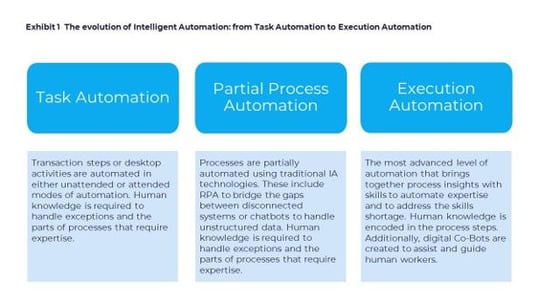Execution automation to tackle the skills shortage

The concept of Intelligent Automation (IA) is evolving, from its starting point that was basic transaction automation using RPA, to Execution Automation (EA) using a combination of productivity mining and Symbolic AI. Execution Automation will go a long way towards addressing the skills shortage that many industries are experiencing in the post Covid world.
Execution Automation
Having the right skills in place has become a big problem for organisations across the world and industries. On the one hand, there is a real shortage of skills compounded by the baby-boomer brain drain, and arguably, accelerated following the pandemic when people reassessed their priorities and chose to either retire completely or go part time. On the other, turbulent times and rising costs across the globe are causing hardship for businesses and many are reconsidering their skills strategy with increasing focus on temporary rather than permanent staff hire. The temporary hire strategy, of course, is full of flaws. Primarily, it is adopted as a way of reducing commitment to on-going costs, and this is debatable. Another issue is that it assumes you can find the right talent to hire on a temporary basis and that brings us back to the skills shortage.
Unsurprisingly, many organisations turn to IA to make up for the shortage of skills, but most invest in the basic level of digitalisation of standardised transactions. Some go further and invest in digital transformation or add a chatbot or intelligent document processing to the mix to automate more of each process. The IA investments can deliver significant benefits in terms of business efficiency and throughput, and if done well, they can free up staff to do more of the higher value work that requires skills, but more can be achieved.
There is another higher level of process automation that organisations can reach today that truly addresses the skills shortage, and that is Execution Automation. Exhibit 1 provides an overview of the different levels of process automation.
Exhibit 1

XpertRule and KYP.ai have come together to offer Knowledge Automator, a solution that allows organisations to achieve that higher level of automation – Execution Automation.
Knowledge Automator comes in two parts: The first is provided by KYP.ai, deployed to collect data about the organisation’s business processes and their health in terms of levels of optimisation and digitalisation. KYP.ai also maps the process steps and identifies opportunities for their improvements and automation. The process insights from KYP.ai can be used to automate more of each process using IA technologies. Importantly, to address the skills shortage, KYP.ai finds the high performers as well. These are the team members who do most of the work and apply best practice to their daily routines. They are the process experts.
Once the process intelligence is gathered, KYP.ai passes the information to XpertRule. This includes the process steps and who the experts are.
XpertRule’s low code / no-code knowledge acquisition interface allows the experts to easily encode their knowledge into the process steps. XpertRule, applies a combination of Symbolic AI and machine learning techniques to capture examples of decision making from the experts from which decision trees are automatically induced. These induced trees in combination with additional decision tables, rules and calculations captured from the experts will incorporate the best corporate expertise that can automate knowledge-based processes leading to Execution Automation.
Take pension administration as an example; when a customer gets in touch about transferring their pensions from another provider there will be a number of questions to ask to establish the exact type of pension. The objective is to ascertain what benefits are included in the existing pension to ensure that they are not lost when the pension is transferred and to offer a suitable alternative to the customer.
In this scenario, KYP.ai can be used to identify the steps that a pension’s expert takes. These include routine administrative steps, such as basic name and details gathering, to what systems and knowledge bases the expert accesses to look up rules and pension options as part of answering the customer’s questions. The information is then passed on to XpertRule to encode and automate including working with the expert, who using its low code interface digitalises the steps as automated workflows, decision trees, decision tables, rules and calculations. Once the system goes live, it can help the customer select a suitable alternative pension and stop them from choosing one that would deprive them of the benefits of their existing pension. Other knowledge-intensive processes can be automated in a similar way and the beauty of the combined offering from KYP.ai and XpertRule is that the solution can be deployed fast.
One novel aspect of the XpertRule Execution engine is that in addition to automating the execution of knowledge based processes, it can also upskill / multi skill workers to carry out tasks beyond their skill sets. This is achieved by deploying the captured expertise described above as Intelligent Digital Advisors or Co-Bots (Collaborative Robots) running on the workers desktop / browser and guiding them to follow best practice procedures / decisioning making. This is particularly important for call centre agents who are delivering customer service and advice as it ensures that every agent is equipped with the multiple skills of the best agent in every skill.
EA takes automation to new levels and helps organisations address the current skills shortage.
To find out more about Execution Automation contact:
info@kyp.ai or info@xpertrule.com
Tags:
Decision Intelligence